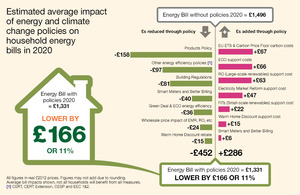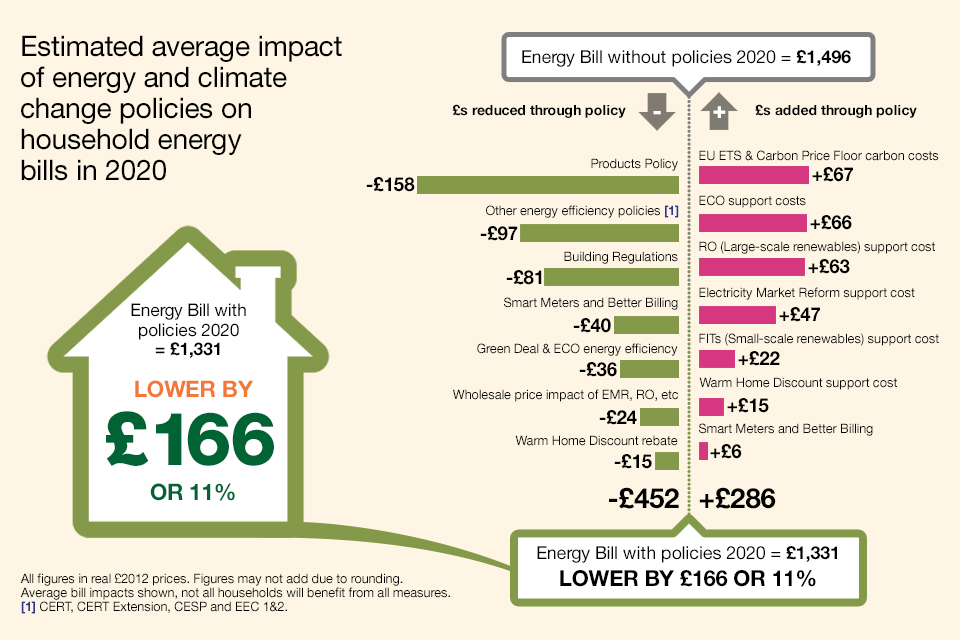Policies are putting a cushion between energy prices and household bills - Davey
New analysis highlights the extent to which energy and climate change policies are tempering the impact on household energy bills of global gas prices and network costs.

Infographic showing estimated average impact of energy and climate change policies on household energy bills in 2020
Press notice: 13/031
New analysis published today highlights the extent to which the government’s energy and climate change policies are tempering the impact on household energy bills of global gas prices and network costs.
Although global gas prices and network costs have driven household energy bills up in recent years, and are predicted to continue to do so, the Government is pursuing policies aimed at putting a cushion between the price of energy and the bills paid by householders.
While some policies are adding to household bills, others lead to reductions, and the net result, based on the most thorough evidence base to date, is that households are on average better off than they would have been in the absence of policies.
Today’s householders are paying on average £64 or 5% less for their gas and electricity bills as a result of energy and climate change policies compared to if no policies had existed, and in 2020 the net saving against the do-nothing scenario will reach £166 or 11%.
Publishing ‘Estimated impacts of energy and climate change policies on energy prices and bills’, Ministers pledged to do even more to help people and businesses struggling with high energy bills caused by long-term rising gas prices.
The Government’s energy and climate change policies will help meet the UK’s carbon reduction commitments; keeping the lights on through a diverse energy mix and placing the British economy at the leading edge of a new booming global green energy market worth around £3.3 trillion and growing larger every year.
Secretary of State Edward Davey said:
“Global gas price hikes are squeezing households. They are beyond any government’s control and, by all serious predictions, are likely to continue rising.
“We are doing all we can to offset these global energy price rises, and while we have more to do, this new study shows our policies are putting a cushion between global prices and the bills we all pay.
“The analysis shows that our strategy of shifting to alternatives like renewables, and of being smarter with how we use energy, is helping those that need it most save money on their bills.
“The poorest who take advantage of the help that is available through the initiatives we have on offer stand to make the highest savings, from the Warm Home Discount to our new regulation on energy firms to force them to improve the energy efficiency of fuel poor households.
“The analysis underlines the importance of pressing ahead with the range of steps we’re taking to decarbonise and insulate our economy from excessive reliance on imported gas.
“The picture for businesses is less positive, which is why our new proposals to exempt and compensate the most energy intensive industries from certain policy impacts is crucial. Nothing would be gained from forcing industry, jobs and emissions abroad.
“The move to a low-carbon power sector is bringing thousands of jobs to every corner of the country today, and will continue to do so. Last year we saw 20,000 new jobs in the renewables sector alone. This is driving growth through our supply chains and for businesses across the UK.
“This analysis is an important exercise in transparency. It’s based on the most comprehensive evidence available. I hope it will lead to far a more informed debate about the benefits of our energy and climate change strategy.”
The ‘Estimated impacts of energy and climate change policies on energy prices and bills’ report published today shows that:
-
Energy bills are likely to continue on an upward trend, with or without policies, as a result of rising fossil fuel prices and network costs.
-
Wholesale gas and electricity costs currently make up the largest proportion of an average household energy bill – around 47% in 2013.
-
Transmission, distribution and metering costs account for 20%, other supplier costs and margins account for 19% and VAT 5%.
-
Household dual fuel bills are estimated to be on average 5% (or £64) lower today than they would be without policies being pursued.
-
Household dual fuel bills are estimated to be on average 11% (or £166) less in 2020 than they would be without policies being pursued.
-
The conclusions are consistent with those of the independent Committee on Climate Change (CCC), that increases in energy bills have been driven by the international price of gas. The CCC also finds that there are opportunities for improvements in energy efficiency to more than offset the increased cost to households of the investment needed to deliver a low-carbon future.
Although the costs of policies will also increase in future in order to support increasing low carbon investment, energy efficiency policies will continue to drive down bills:
-
By 2022, around half the UK household population is expected to have at least one major insulation measure (loft, cavity wall or solid wall insulation) delivered through energy supplier obligations which could save households from £25 to £270;
-
Households could benefit from further efficiency improvements if they choose to take up a Green Deal;
-
Tighter efficiency standards for household energy appliances are expected to deliver an average annual saving of around £158 per household in 2020;
-
Around 12 million gas condensing boilers will be replaced with newer, more efficient versions between now and 2020, saving each household from around £20 to £120 or more per year;
-
Smart Meters will be rolled out to all households by the end of 2019, helping households make more informed energy decisions.
Businesses that are medium-sized users of energy currently face energy (gas plus electricity) costs that are on average 21% higher as a result of policies. By 2020 they will be 22% higher as a result of policies.
For most businesses energy costs are a small proportion of total business costs – less than 3% on average for the UK manufacturing sector.
Large energy-intensive users currently face energy costs that are on average between 1 and 14% higher as a result of policies. By 2020 the impact is estimated to be between 6 and 36%.
The estimates do not include measures Government is currently considering to reduce the impact of low-carbon policies on the costs of electricity for energy intensive industries, which includes a £250 million package of compensation for industry to 2014-15.
The Chancellor has announced at Budget that the Government will continue to provide support for energy-intensive industries to 2015-16, with the detail of this support to be confirmed through the spending review in June.
In addition, the Government will introduce exemptions from the Climate Change Levy for energy used in metallurgical and mineralogical processes from 1 April 2014.
The Government is also exploring options for reducing the future impact of Contracts for Difference on electricity costs for electricity intensive industries.
Notes for Editors:
- The ‘Estimated impacts of energy and climate change policies on energy prices and bills’ assesses the impact of Government policies on gas and electricity prices and bills, and updates the analysis published in November 2011. Full details are available on the ‘Policy impacts on prices and bills’ page.
- This year’s analysis includes the estimated impacts of Building Regulations which have set minimum standards of efficiency for gas condensing boilers since 2002. This was not captured in previous analysis due to the absence of robust savings estimates. But, we also included the impact without Building Regulations for complete transparency.
- The average UK household dual fuel (electricity and gas) energy bill will be around £1,267 in 2013 based on average consumption.
- UK households currently pay the lowest retail gas prices and among the lowest retail electricity prices in the EU 15.
- All figures are expressed in real 2012 prices.
- Please see the infographic below which illustrates the analysis.

Infographic showing estimated average impact of energy and climate change policies on household energy bills in 2020